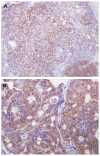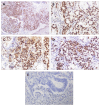Her2-Positive and Microsatellite Instability Status in Gastric Cancer-Clinicopathological Implications
- PMID: 34070574
- PMCID: PMC8228707
- DOI: 10.3390/diagnostics11060944
Her2-Positive and Microsatellite Instability Status in Gastric Cancer-Clinicopathological Implications
Abstract
Gastric cancer (GC) is one of the leading causes of cancer-related death. The combination of new molecular classifications with clinicopathological data could contribute to the individualization of patients and to the development of new therapeutic strategies. We examined the various associations in two molecular types of GC: HER2-positive (human epidermal growth factor receptor 2) and microsatellite instability (MSI), assessing their influence on treatment and prognosis. A retrospective study of 142 GC patients was performed with molecular characterization through HER2 overexpression and DNA repair protein expression for MSI. The percentage of HER2-positive tumors was 13.4%, predominantly in men. Correlations were found with intestinal type, metastases, advanced stages and chemotherapy. Almost 75% of HER2-positive patients died. MSI occurred in 16.2%, associated with advanced age, female sex, distal location and intestinal type. These patients had few metastases and low stages. The percentage of deaths was higher among MSI patients who received perioperative chemotherapy. The determination of HER2 and MSI status in GC is important for their association with specific clinicopathological features and for their prognostic and predictive value.
Keywords: HER2; clinicopathological features; gastric cancer; microsatellite instability; molecular classification.
Conflict of interest statement
The authors declare no conflict of interest. The funders had no role in the design of the study; in the collection, analyses, or interpretation of data; in the writing of the manuscript, or in the decision to publish the results.
Figures



References
-
- Garattini S.K., Basile D., Cattaneo M., Fanotto V., Ongaro E., Bonotto M., Negri F.V., Berenato R., Ermacora P., Cardellino G.G., et al. Molecular classifications of gastric cancers: Novel insights and possible future applications. World J. Gastrointest. Oncol. 2017;9:194–208. doi: 10.4251/wjgo.v9.i5.194. - DOI - PMC - PubMed
-
- Birkman E.M., Mansuri N., Kurki S., Ålgars A., Lintunen M., Ristamäki R., Sundström J., Carpén O. Gastric cancer: Immunohistochemical classification of molecular subtypes and their association with clinicopathological characteristics. Virchows Arch. 2018;472:369–382. doi: 10.1007/s00428-017-2240-x. - DOI - PMC - PubMed
Grants and funding
LinkOut - more resources
Full Text Sources
Research Materials
Miscellaneous

